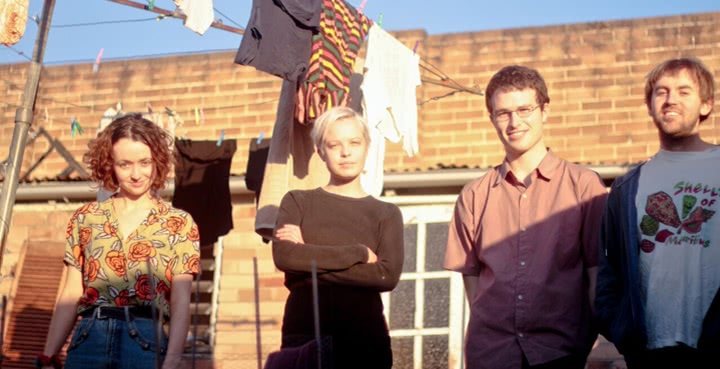There are many things involved in building a band’s following apart from producing some attention-grabbing output. Luck will always play a role, but good organisation and shrewd decision-making certainly doesn’t go astray. Day Ravies released their debut LP, Tussle, in late 2013.
While the record’s woozy alt-pop sound gained critical praise and nabbed the band a coterie of enamoured fans, it’s fair to say the Sydney foursome is yet to make a major breakthrough. Day Ravies’ second album, Liminal Zones, comes out this weekend, and this time around the band is better positioned to make a big impact.
“The first album was a massive learning curve in every respect,” says co-vocalist and keys player Caroline de Dear. “None of us had put out anything quite as significant before. The first album came out with Popfrenzy, but we decided we wanted to do something a bit different with this one – that was quite a conscious decision.”
It is a poor workman who blames his tools, but Day Ravies don’t begrudge their former label for failing to make them superstars. Nevertheless, they decided to take the release of Liminal Zones into their own hands. “Sam [Wilkinson, guitar/vocals] actually started his own label, Strange Pursuits,” says de Dear. “And we’re releasing the CD through Strange Pursuits and the vinyl through Sonic Masala. We’ve made decisions about this release because of our experiences the first time around. We’re all feeling much more confident about it this time.”
The band’s increased confidence isn’t limited to the logistical details. Liminal Zones showcases a sharper and more intrepid group thanthe one responsible for Tussle. Over the course of their relatively short history, there have been stacks of subgenres thrown at Day Ravies – everything from shoegaze to art rock, no wave and dream pop. To add to that pile, Liminal Zones introduces a wacky synth-based new wave sound.
“All of our musical tastes are fairly diverse, and I think it’s only natural that that comes across through the music you make,” says de Dear. “It’s entirely dependent on what we’re listening to and what we’re inspired by. We’ve all been huge Devo fans forever, and then we started investing in synths, and it seemed only natural that would be part of the album, and we’d try to make it more textural and experiment with different kinds of instrumentation. Lani [Crooks, bass/vocals] and I play flute and clarinet on the album as well. We were a lot more experimental with our choice of instrumentation in general.”
Day Ravies’ willingness to experiment with new tools also led to a modified recording arrangement. While Tussle’s mixing engineer Pete Beringer was involved again, they also tried out a homespun approach.
“We did record this one with Peter and we also recorded with Sam at his and Lani’s house on their eight-track,” de Dear explains. “There’s a few tracks in the middle of the album that we recorded at home on the eight-track in the middle of last year. We liked them so much, we couldn’t not have them on the album. Seeing as the musical influences are fairly diverse, we thought, ‘It doesn’t really matter if there’s inconsistent recording technology.’ So we were working with Pete again – and it was mixed by Sam and Pete.”
Thankfully, the implementation of various recording techniques hasn’t made for a patchy listening experience. In fact, as a whole, Liminal Zones is a more sprightly and sonically forceful affair than its predecessor.
“I think everyone had a lot more fun with this one,” agrees de Dear. “It’s like that awkward first date – you get the first one out of the way and then you have a better idea about how it’s going to go and you can have so much more fun. So even though it took so long to record – I think we were recording over a year and we had issues with hard drives and all of that kind of stuff – it was a very enjoyable year.
“Sam knows exactly what we’re going for, but with Peter, because he’s not in the band, we rattled off a few albums and bands that we really want to sound like and that we really enjoy the production of.”
When it comes to the songwriting, however, it’s a different story. The band members clearly have far-reaching tastes, but it’s not often they try to directly invoke other artists or stylistic formats.
“Because we’re all so close, we all know what each other are listening to at any given time,” de Dear says. “But the songwriting is never that formal. All four of us write songs for the band and I think our influences are a part of that. And then when we start playing demos that we’ve made individually, everyone else’s influences enter the mix.
“What I really like about this album is I think there’s a real immediacy to it. It’s sort of fast and furious and really mixed and it’s so much more energetic and interesting for all of those reasons. Recording across different formats really helped as well. We weren’t limited to doing it a really traditional way. We just sort of were impulsive and did what we felt like.”
Liminal Zones is out Friday July 10 through Strange Pursuits/Sonic Masala. You’ll have to wait untilFriday November 6 to see them play the Roxbury Hotel.

































